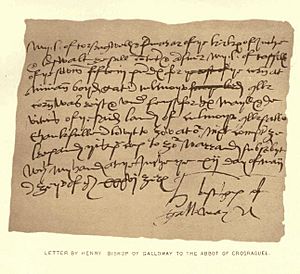Henry Wemyss facts for kids
Quick facts for kids Henry Wemyss |
|
|---|---|
| Bishop of Galloway | |
| Church | Roman Catholic Church |
| See | Diocese of Galloway |
| In Office | 1526–1541 |
| Predecessor | David Arnot |
| Successor | Andrew Durie |
| Orders | |
| Consecration | after 1 March 1526 |
| Personal details | |
| Born | unknown unknown |
| Died | 14 March × 21 May 1541 |
| Previous post | Official of Galloway (1512 × 1517–1522 × 1526) Archdeacon of Galloway (1513 × 1522–1531) |
Henry Wemyss (died 1541) was an important church leader, known as a prelate, in 16th-century Scotland. He first appeared in church records in the bishopric of Galloway around 1517. He became the Bishop of Galloway in 1526 and held this important position until he passed away in 1541.
Contents
Who Was Henry Wemyss?
Henry Wemyss was a significant figure in the Scottish church during his time. He was a member of the Wemyss family, a well-known family from Wemyss in Fife. Some records suggest his father was John Wemyss.
Family Connections
It is believed that Henry Wemyss might have been related to David Arnot. David Arnot was also a Bishop of Galloway before Henry. David Arnot later gave up his bishop role, and Henry Wemyss took over.
Henry's Early Career
Before becoming a bishop, Henry Wemyss held several other important roles in the church. These roles helped him gain experience and move up in the church hierarchy.
Church Official
By 1517, Henry was working as an Official for the diocese of Galloway. A diocese is a church area managed by a bishop. An Official helps the bishop manage the church's legal and administrative tasks. He held this position until at least 1522.
Parish Priest and Archdeacon
Henry was also a parson (a priest in charge of a parish church) in Auchterderran, Fife. Later, he became the Archdeacon of Galloway by 1522. An archdeacon is another church leader who helps the bishop oversee the churches and clergy in a specific area. He held this role until 1531.
Becoming Bishop of Galloway
Henry Wemyss became the Bishop of Galloway in 1526. This happened after David Arnot, the previous bishop, decided to step down.
Taking on New Roles
When Henry became bishop, he also took on the role of Dean of the Chapel Royal in Stirling. This was a special church connected to the royal family.
He also gained control of Tongland Abbey and Dundrennan Abbey. These were important religious houses. Taking on these roles meant he was in charge of their lands and income.
Public Life and Legacy
Bishop Wemyss was very active in public life. He often attended parliament, which is where laws were made in Scotland. His name frequently appeared as a witness on important official documents called charters. These documents were sealed with the Great Seal of Scotland, showing their importance.
His last known public appearance was on March 14, 1541. He passed away shortly after this date, sometime before May 21, 1541. After his death, Andrew Durie took over his church positions.
Some letters written by Bishop Henry Wemyss still exist today. These letters were sent to William Kennedy, who was the Abbot of Crossraguel Abbey. It is believed that Bishop Henry and Abbot William were good friends. These letters show us a bit about their friendship and the issues they discussed, like land and money matters.
 | Delilah Pierce |
 | Gordon Parks |
 | Augusta Savage |
 | Charles Ethan Porter |


